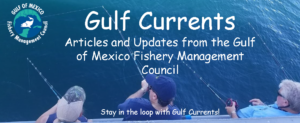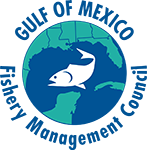

The Gulf Council is comprised of fishermen and other experts in the fishery from across the Gulf of Mexico. Drawing upon the expertiseof these local fishermen ensures that federal fishing regulations are made with direct understanding of, and passion for, our fishery. The Council is honored to have Captain Ed Walker as one of its newest members.
Captain Ed Walker grew up on the shores of Indian Rocks Beach, Florida. As an adolescent, he learned to fish from the ‘old-timers’ at the Indian Rocks Beach Pier. On Friday’s after school, his mom would drop him off with his friends and they would spend the weekend fishing for tarpon and mackerel by day and for shark at night. He nostalgically mentions that it’s not something you would do these days but back then, it was safe and very liberating to spend time with nothing to burden them but sleeping bags, sandwiches, and fishing gear.
In 1985, Hurricane Elena blew the pier down and he was inspired to buy his own boat. Around the same time, he started college. He also started running inshore charters and guiding for tarpon along the coast. In addition to a ton a fish, Ed landed a weekly television spot for the local news channel. The publicity from his show gave him more business than he could take and he put college on hold while he pursued his fishing career full time. Once he had a baby on the way he did eventually go back to finish his degree. Though his fishing career was successful, he wanted to ‘check the college box’.
As his career evolved, Capt. Walker moved further offshore. He started deck handing on an offshore boat to gain the knowledge and experience he needed before buying an offshore boat. Once he got his own offshore boat he ran charters and bought a commercial permit to supplement his income when the recreational seasons tightened. These days, his business is multifaceted and he splits his time inshore and offshore fishing both commercially and for-hire up and down the Gulf coast of Peninsular Florida.
Once he got his own offshore boat he ran charters and bought a commercial permit to supplement his income when the recreational seasons tightened. These days, his business is multifaceted and he splits his time inshore and offshore fishing both commercially and for-hire up and down the Gulf coast of Peninsular Florida.
He’s also an avid private angler, and after being inspired by some charter clients, he started pursuing world records through the International Game Fish Association. To date, 42 world record fish have been landed on his boat. About 20 of those are attributed to him, his son, and his wife.
Ed is a strong proponent of cooperative research and has teamed up with different academics and research teams from Florida’s Fish and Wildlife Conservation Commission to do studies on a variety of species including gag, goliath, red grouper, greater amberjack, tarpon, and trout. No stranger to federal fisehries management, Ed spent years serving on Gulf Council Advisory Panels, most recently as the chairman of the Reef Fish Advisory Panel.
Capt. Walker answered the following questions to provide some insight on his perspective of the Gulf fishery:
Can you share your favorite fishing memory?
“In 1998, I competed in the world’s richest tarpon tournament in Boca Grande, Florida. All the guys that fished the tournament did it the old-fashioned way. They would drift slowly in the pass fishing from the back of their big inboard boats. We were in the smallest boat in the tournament and we used, what was at the time, modern techniques including monofilament line, highspeed reels, and we fished from the bow of our little outboard. That year, we won 1st, 2nd, and 3rd place prizes and took home  the largest purse ever won in a tarpon tournament worldwide- which was $247,000. Usually, the town closes down to celebrate the hometown hero but that year the streets were relatively quiet because we came from out of town and broke tradition.
the largest purse ever won in a tarpon tournament worldwide- which was $247,000. Usually, the town closes down to celebrate the hometown hero but that year the streets were relatively quiet because we came from out of town and broke tradition.
As a council member how do you hope to improve the fishery?
“My biggest priority is to help develop a more accurate method of estimating recreational catch. Recreational catch estimates cascade into every management decision we make but the federal program is wrought with uncertainty. It is a tough nut to crack because the current program is considered to be the ‘best available’ data and it’s so complicated that a regular person like me can’t easily pinpoint what’s wrong. The latest gag numbers are a perfect example of how the federal recreational data collection program is overly sensitive to outliers and suffers from small sample sizes. The estimates that came from the State of Florida are hugely different and the recreational fishing sector is being punished for a failure of the data collection methodology. Council has been dealing with the recreational data collection issue for years and it’s time to finally end this. In many cases, I feel that recreational and charter operators are being unfairly penalized for inaccurate catch estimates. We owe it to the angling community to do better. Getting a charter for-hire data collection up and going is a good start so that part of the sector is accountable.”

